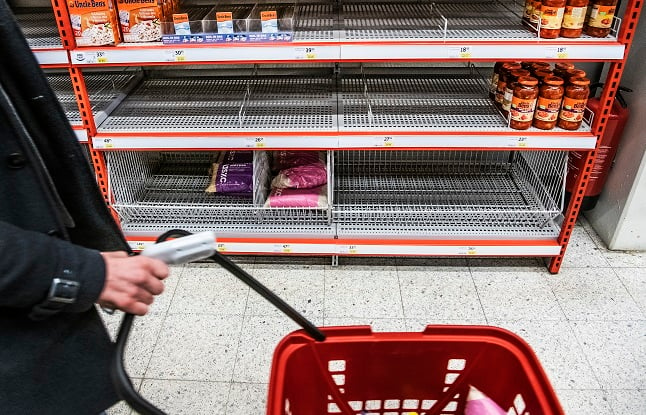The general advice from Swedish authorities is always to have enough supplies at home to see your household through one to two weeks if needed.
“We always recommend that everyone should be prepared, which means you should have a supply of food and any other stuff that you need for some time, for example if you use medication you should have that at home,” Maria Bergstrand, an operative manager from the Swedish Civil Contingencies Agency (MSB), told The Local.
“In this situation, you should have enough supplies so that you don't have to go out and do grocery shopping and so on if you're ill. You should stay at home, it is really important that you don't go out and maybe spread the disease to other people.”
Elderly people (aged over 70) and those in at-risk groups have also been advised to stay at home as much as possible, and avoid shopping in person. If that applies to you and you don't have a friend, relative or neighbour who can do your shopping, there are various community initiatives springing up around the country.
LATEST ON THE CORONAVIRUS IN SWEDEN:
Examples of foodstuffs recommended by the MSB for your home supply include potatoes, bread with a long shelf-life, long-life milk or oat milk, cheese, pasta and rice, chopped tomatoes, coffee, tea and chocolate.
You can refer to the Civil Contingencies' Agency booklet If Crisis or War Comes here (in English), which contains further information of things to think about.
That said, it's important to remember that the booklet is about preparedness for a wide range of potential emergency situations, and covers situations that the coronavirus is unlikely to lead to, such as a lack of drinking water or heating.
And even if you end up needing to self-isolate because of the coronavirus, you don't need to be restricted to the food in your cupboards. Food delivery services can still be used, or you can ask friends, relatives or neighbours to drop off groceries (which they should leave on your doorstep, and you should collect once they're more than a few metres away).
Even in Italy, the country in Europe currently with the most widespread coronavirus outbreak and the strictest social distancing measures in place, supermarkets remain open and healthy people are able to shop for food, as long as they keep their distance from other shoppers.

People queue outside a supermarket in Rome keeping a metre's distance. Photo: Alfredo Falcone/LaPresse via AP
Bergstrand said that there were no indications that the coronavirus outbreak would lead to any kind of food shortage.
“We don't foresee that; all the supply chains are still working. Shelves in shops may be empty, because on a normal Friday in March last year people weren't all buying pasta and toilet paper at the same time and now they are, but in the next day or so those should be on the shelves again,” she said.
“We don't expect that major supply chains will stop working, and we expect that it will continue like this. Maybe there are certain specific products that you won't find in the shops if this goes on for a long time, but we will still have enough food, we will be able to eat well and be healthy.”
She said that the same applied to medicine supply chains, and that it's unlikely that the coronavirus will lead to power outages or loss of clean water.
“No, we don't think so. We are working with that, and have recommended to [the organizations and individuals who are responsible for provision of water and electricity] that they should be working with this right now, planning so that their organisation and work will be able to continue even if some staff are home sick, for example. We've been giving recommendations and support to these organisations,” said Bergstrand, adding that none of the relevant organisations had raised any concerns about their ability to continue so far.
As for what else individuals can do to be as prepared as possible without panicking, she recommended keeping up to date via the Swedish Public Health Agency and KrisInformation, both of which offer some information in English.
“What's really important right now is that we all take our own responsibility. If you're ill, stay at home. Maybe check in on our relatives, friends and neighbours to check everyone is OK and see if you can help,” she said.


 Please whitelist us to continue reading.
Please whitelist us to continue reading.
Member comments